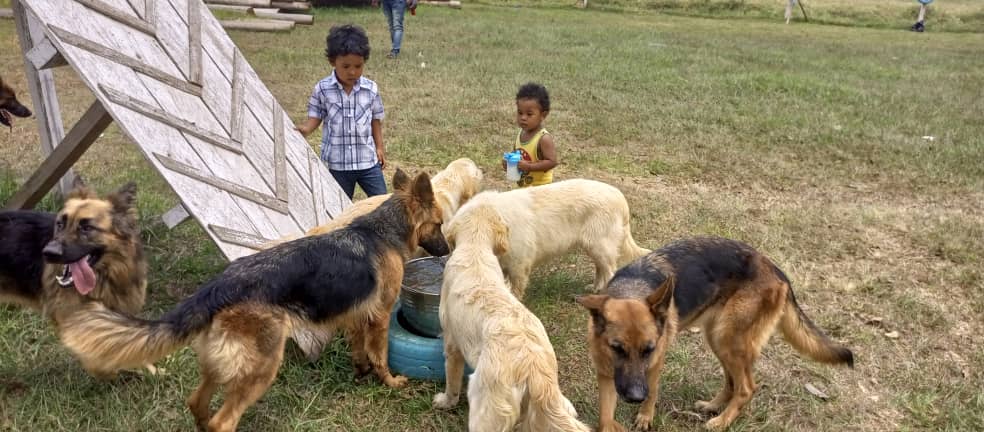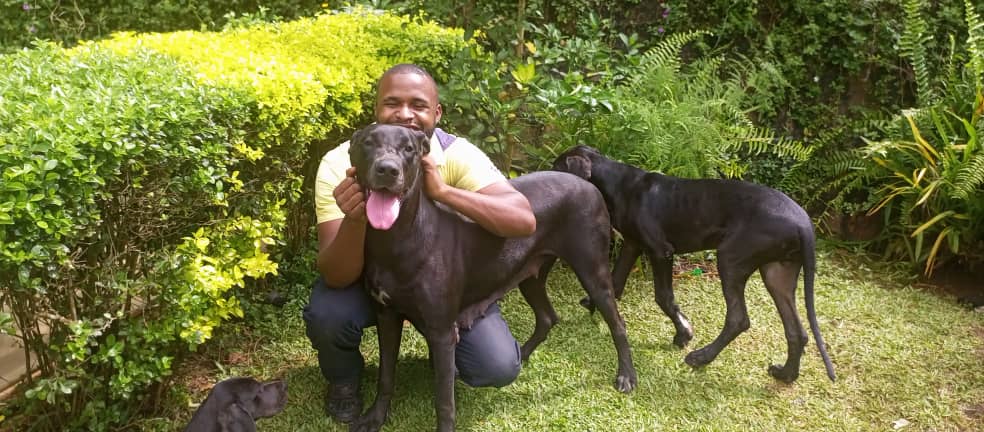Behaviour growth in dogs.

The behaviour of dogs has a lot to do with why we prefer to be with them. People cherish dogs with preferred behaviour, while those with unwanted behaviour risk losing their cherished caretakers. However, the behaviour of our dogs is largely due to us. As dogs grow up, they learn from us what we prefer and go on with that in their life. Thus at their tender age- puppy stage, we have a chance to influence their behavior.
Physical maturation and the development of the nervous system are intricately linked to behavioural development in puppies. Typically, we categorize puppy development into four stages: neonatal, transitional, socialization, and juvenile. Yet, it’s essential to understand that these stages aren’t rigidly fixed; different breeds may progress at varying rates, and environmental factors can influence genetic expression.
Factors such as prenatal conditions, including the diet and health of the mother (dam), can significantly impact puppy development. Research in other species has demonstrated that offspring from mothers exposed to stressful handling during pregnancy may exhibit heightened sensitivity to stressors. These four developmental periods remain valuable reference points for discussions on puppy development.
Neonatal stage
During the neonatal stage, which spans from birth to approximately two weeks of age, puppies rely primarily on touch and olfaction as their eyes are yet to open, and their ear canals remain closed. Despite their immature nervous system, neonates demonstrate responsiveness to their surroundings. Research has indicated the profound impact of maternal care and human interaction during this critical period. Puppies receiving more maternal attention during this period tend to exhibit higher levels of social and physical engagement as adults compared to those with less attentive mothers. Similarly, studies have shown that gentle handling of puppies by humans from as early as three days old results in calmer and more confident behaviour by the age of eight weeks compared to those not handled by humans. Given these findings, foster families and breeders must initiate soft handling of puppies as soon as possible, as it can significantly influence their development and behaviour in later stages of life.
Transitional stage
The transitional stage, spanning approximately seven days (with a range of about 14 to 21 days of age), marks a significant developmental milestone for puppies. It’s during this period that their eyes and ears begin to function, and their muscle coordination improves notably. Additionally, social communication behaviours, such as growling, and interactions, like playful behaviour, become evident for the first time. As puppies become more cognizant of their surroundings, they also gain the ability to defecate and urinate without maternal stimulation. This newfound independence makes it an opportune moment to introduce them to an appropriate substrate to defecate and urinate on, especially since they are starting to venture further from the nesting area. You can introduce them to elimination substrates such as grass, dirt, gravel, etc. Take those puppies to these substrates and encourage them to urinate and defecate on them. Thereafter reward them. These proactive approaches help facilitate proper urination and defecation habits as they continue to grow and develop.
SOCIALIZATION STAGE
Socialization encompasses the crucial process of developing appropriate social behaviours towards not only fellow members of their species but also other species, as well as adapting to relevant environmental stimuli. It’s during this period that puppies learn how to interact effectively with their surroundings and form lasting behavioural patterns. Socialization plays a crucial role in a puppy’s development, particularly during the sensitive period—a phase where external stimuli have a profound impact on long-term behaviour. This critical period typically starts around 3 weeks of age and persists until around 3 months. Failing to adequately socialize during this time can result in fearful responses towards unfamiliar humans or situations later in life.
Ensuring controlled exposure to humans during the critical socialization period is crucial, as even brief interactions can yield significant benefits. Research indicates that puppies who receive handling from an early age are more likely to exhibit confidence and ease in approaching humans. Conversely, those who lack such exposure until later stages, such as 7 weeks may display hesitancy or persistent fearfulness towards human interaction. Those who lack exposure for around 3 months and beyond continue to persistently display fear throughout their life. Therefore, prioritizing early and consistent handling can greatly influence a puppy’s sociability and comfort with human contact throughout their development.
Take note!
Negative experiences during this sensitive developmental window can significantly shape a puppy’s behavioural trajectory. Abrupt weaning, particularly when combined with sudden separation from littermates, can have enduring effects on behaviour. Studies suggest that puppies separated from their mother and litter before reaching 8 weeks of age are more likely to exhibit fearfulness and display undesirable behaviours in adulthood compared to those who remain with their litter until at least 8 weeks old. Thus, ensuring the proper timing and gradual transitions during the weaning and separation process is essential for promoting healthy behavioural development in puppies.
JUVENILE STAGE
The juvenile stage marks the period from the conclusion of the socialization phase to sexual maturity (3 months to around 6 months). While sexual behaviour typically emerges around 6 months of age, this timeline may vary, especially in larger breeds where maturity might be delayed. Despite reaching sexual maturity, dogs often retain behavioural immaturity. In the case of large-breed dogs, social maturity may not occur until they are 18 months old or even later. Given the prevalence of behaviour issues during this phase, it’s advisable to visit a veterinarian for adolescent behavioural well-care visits. These visits can provide essential support and guidance for both the dog and you the owner during this developmental stage.
Socialization Program
The importance of socialization in puppies cannot be overstated, and it’s never too early or too late to begin. Healthy puppies, regardless of age, can benefit from regular exposure to new environments, ideally at least twice a week. However, it’s crucial to avoid places frequented by dogs of uncertain health and vaccination status. When introducing a puppy to new experiences, it’s essential to let them explore at their own pace, ensuring they remain calm and unafraid.
Owners should bring along treats and toys to make the experience enjoyable, but if the puppy becomes too frightened to engage, it’s important to end the session promptly.
Introductions to humans should start with quiet adults and then gradually include children who can interact gently. Socialization with other puppies and adult dogs known to be gentle with puppies is also beneficial, but it should be done cautiously.
Some puppies may find even mild stimuli overwhelming, requiring adjustments to the socialization plan under the guidance of a veterinarian or animal behaviourist. If fear persists or is severe, it’s essential to discuss a comprehensive behavioural treatment plan with a professional. Repeated exposure to frightening stimuli without proper intervention can lead to sensitization, potentially irreversibly impacting the puppy’s behaviour.
Puppy socialisation classes.
Puppy socialization classes are an opportunity for puppies to learn how to behave calmly around humans and dogs. Puppies that attend socialization classes are less likely to be rehomed than puppies that do not attend similar classes.
Puppy socialization classes represent a critical phase in a young dog’s development, often starting around three weeks of age. However, it’s imperative to understand that puppies do not complete their vaccinations until they are between 12 to 24 weeks old. Consulting with your veterinarian before attending these classes is essential to ensure your puppy is fully vaccinated and healthy, thereby minimizing the risk of contracting and spreading diseases during their interactions.
In addition to vaccination status, evaluating the enrollment requirements of local puppy classes can further mitigate risks. Opting for classes where the instructor mandates initial vaccinations and veterinary health certificates is ideal. This proactive approach helps create a safer environment for all participants. Furthermore, well-run classes are crucial to fostering a positive learning environment. Puppies should not be overwhelmed or frightened during sessions. A skilled instructor can structure activities to gradually expose puppies to new experiences, helping them build confidence and develop crucial social skills. This approach ensures that puppies not only learn to interact calmly with humans and other dogs but also enjoy the process, laying a strong foundation for their lifelong socialization and behavioural well-being. Thus enhancing their overall quality of life.
The Ugandan perspective
Currently, in Uganda, there are socialization classes run at the Kampala dog park. Kampala Dog Park provides a haven for dogs to socialize and expend their energy. Beyond frolic, it offers diverse activities including training, playgroups, grooming, and behaviour correction. Moreover, the facility hosts interactive sessions to enlighten owners about their pets’ intellect and needs, fostering deeper understanding and connection. In Uganda, while Kampala Dog Park shines, other socialization classes may exist; however, further exploration is necessary to unearth them. Whether in bustling Kampala or nestled elsewhere in Uganda, these spaces play a pivotal role in nurturing not just physical health but also the emotional and behavioural well-being of our beloved canine companions. This enhances our experience with them.
In conclusion, early interaction between dog owners and their pups, even as young as 3 days old, is crucial. Ensuring timely core vaccinations and guiding their social interactions are imperative steps. However, it’s essential to be vigilant during socialization, as puppies can develop lasting behaviours during the critical period that occurs during the socialization phase. Seeking professional assistance when faced with challenges is highly recommended to ensure the well-being and proper behaviour development of the dog.
References
Developmental Stages of Puppies, Ellen Lindell, VMD, DACVB, Veterinary Behavior Consultations, Asheville, North Carolina.
Grandjean, D., Andre, C.,Bacque, H., Bedossa, T., Boogaerts, C., Clero D., Colliard, L., Grellet, A., Polack, B.,Rogalev, A and Haymann, F. 2020. The Dog Encyclopedia. Royal Canin SAS. www.royalcanin.com. 930 pp.
Scott, JP. and Fuller, J.L1965.Genetics and the Social Behaviour of the Dog. Chicago University Press. 508 pp.
Delhasse, J., 1994. Sensory, Emotional and Social Development of the young Dog. The Bulletin for Veterinary Clinical Ethnology 2(1-2) 6-29.



I’ve been following your blog for months now, and I have to say, you never disappoint. Your insights are always thought-provoking and your writing is top-notch. Keep up the amazing work!